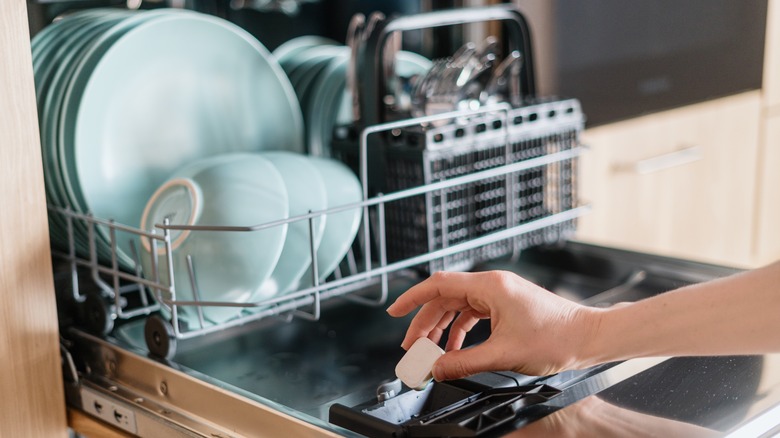It Turns Out Dishwashers Were Not Invented To Make Cleaning Easier
The number of household items today's consumers take for granted is staggering. Though these incredibly efficient tools are ubiquitous around the home, few rooms have a higher concentration of modern marvels than the kitchen. There are tools geared toward food preservation, cooking, and of course, cleaning. The dishwasher is arguably the most effective cleaning tool in your home arsenal, but you should know that the appliance wasn't initially invented for convenience.
An upper-class woman named Josephine Cochrane, tired of her delicate kitchenware being accidentally broken by the vigors inherent to washing dishes manually, decided to try to obviate the task. We've all dealt with dinner parties and damaged dishes, but thanks to Cochrane's invention, which is a standard fixture in contemporary kitchens, it's considerably easier for you to keep your kitchenware happy. But before you celebrate the convenience of this common kitchen contraption, you should know about its origin story, and why it was considered a symbol of wealth for many years after its introduction.
Josephine Cochrane's dishwasher
In the middle of the 19th century, a couple of inventors made what can be considered the original dishwashers, but these early devices were a far cry from the appliances we know today. In fact, these tools were powered manually. While the dishes weren't technically being washed by hand any longer, home cooks still had to physically turn a crank to get their dishes clean.
When you look further into this invention's inception, the dishwasher's origin story, like many historical tales, is peppered with class considerations. Josephine Cochrane was born into an upper-class family with scientific bonafides. She was the great-granddaughter of Jon Fitch, who played a large role in the creation of the steamboat. Cochrane's family wealth meant that domestic workers usually washed her dishes. When she started to notice her dishware being damaged, she started scrubbing the dishes herself, but soon discovered the tedium of this task. Despite her lack of scientific schooling, experimentation ensued, and Cochrane put a patent on the electric dishwasher in 1886.
The evolution of the dishwasher
The dishwasher has become a must-have in the home, but Cochrane's creation took a while to make its way into the mainstream. At the turn of the century, the average home wasn't able to heat enough water to run a dishwasher. In 1893, the dishwasher made its debut at the World Columbian Exposition, more commonly known as the Chicago World's Fair. The initial iterations of the invention weren't suitable for most home kitchens. As such, it was primarily used by big businesses, like hotels.
Several decades later, in the 1950s, there were considerable changes in dishwasher technology. New soaps that didn't leave dishes scummy came to stores, hot water became more accessible, and on the sociological side of things, women were becoming liberated from homemaking duties and could establish themselves in the workplace. Today, the idea of washing the mess that was created when you're hosting a dinner party without the assistance of a dishwasher is almost unthinkable. But be warned. If you unthinkingly use the appliance for any and all dishware and cooking utensils, you could be cleaning your cookware all wrong.


